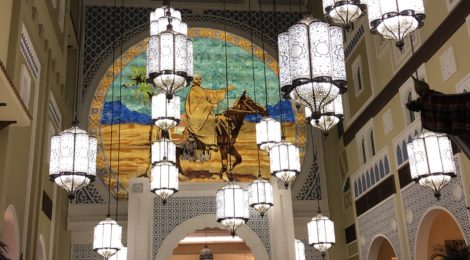
How could Ramadan affect your holiday?
I was at an Iftar buffet on the first day of Ramadan, when a lady on the next table struck up conversation. She had wandered into the buffet area with her husband looking bemused and flustered. It turns out they were tourists staying in the hotel who had booked their holiday to Dubai last year and had no idea about Ramadan or what this meant, and were surprised and confused by the changes that had occurred in their hotel overnight.
Having lived in Dubai for the past 13 years, I have experienced Ramadan many times and don’t really think too deeply about how it affects life here; I accept and embrace the season and sentiment, and carry on. This exchange however, got me thinking about those who may be visiting a Muslim country during Ramadan, completely oblivious that it might affect them.
Times are changing in the UAE, and whilst the way Ramadan is observed by Muslim residents and visitors has been unwavering, the impact that the Holy Month has on day-to-day life here is markedly different to what it was when I first arrived in the city.
With this in mind, I thought it might be useful to write a post about travel to a Muslim country during Ramadan, for those who have holidays planned/are planning trips to places such as Dubai during the Holy Month, to help you understand how it might affect you, and to offer four simple tips:
1. Do your research
How much do you know about Ramadan? Make sure you understand what the Holy Month means, and when it happens (it changes every year). You can check out my previous post here for more info. Also, check how operations will change in your hotel – are all the restaurants staying open? Are there places serving food/drinks during the day? Can you still get food/drink by the pool? Bear in mind that entertainment and live/loud music will be cancelled, and you shouldn’t be eating/drinking/smoking in public – has your hotel catered for this? Being fully informed means you are better equipped to make decisions about your trip.
2. Be prepared for late nights
Active hours generally tend to be a lot later during this time of year. In the UAE, people finish work two hours earlier to go home and prepare the Iftar (breaking of the fast) feast, catch up with family and friends, and pray, so things are very quiet in the late afternoon until the breaking of the fast at sunset, and then the city comes alive until late in the evening – and you’ll want to enjoy it! (Just make sure you aren’t on the roads in the twenty minutes leading to sunset as it can be a hair-raising experience here!)
3. Review your packing list
Think about what you’re planning to wear and respect the culture. When visiting Muslim countries, it is respectful (and in some places, the law) to keep shoulders, knees and stomachs covered, and this becomes even more important during Ramadan. Places like Dubai are fairly laid back now, with bikinis, swim shorts and sundresses being perfectly acceptable on the beaches and in tourist places, but you will see the signs at the entrance to all the malls asking people to ensure they are appropriately covered. During Ramadan it is respectful and courteous to our hosts here to make sure you adhere to this when out in pubic in the daytime, and even when going for your evening meal. Ladies, I’d recommend taking a scarf or pashmina out in the evenings to cover shoulders as you will feel more comfortable among the fast-breaking families, and will enjoy yourself much more.
4. Embrace the experience!
Familiarise yourself with the culture and customs before you leave, and then get out there and experience it for yourself. If you’re visiting an unfamiliar country, it’s unlikely you will get the chance to experience a home Iftar, but you can easily enjoy a lot of the elements by attending a hotel/restaurant Iftar buffet where you will get to try all of the delicious foods and drinks that are synonymous with this time of year, and feel the atmosphere of the people and place. Also, look to see if there are any specifically designed cultural experiences around Ramadan, for example, here in Dubai, the Sheikh Mohammed Centre for Cultural Understanding hosts a fantastic Iftar experience with local guides explaining Islam and the Holy Month, giving a tour of a mosque, offering great food and a chance to ask any question under the sun! I previously collated a list of my favourite Iftar experiences in Dubai here, including the SMCCU, and these still remain among my favourites all these years later!
So there you have it, my humble advice on what to consider when planning a holiday to Dubai, or any Muslim country, during Ramadan. (Incidentally, if you’re an expat working in Dubai during Ramadan, I’ve also previously shared my thoughts on how to make the most of it here). Please do let me know if you have any other thoughts or advice, as I’d love to keep extending the list…
Ramadan kareem, and safe travels to all!











